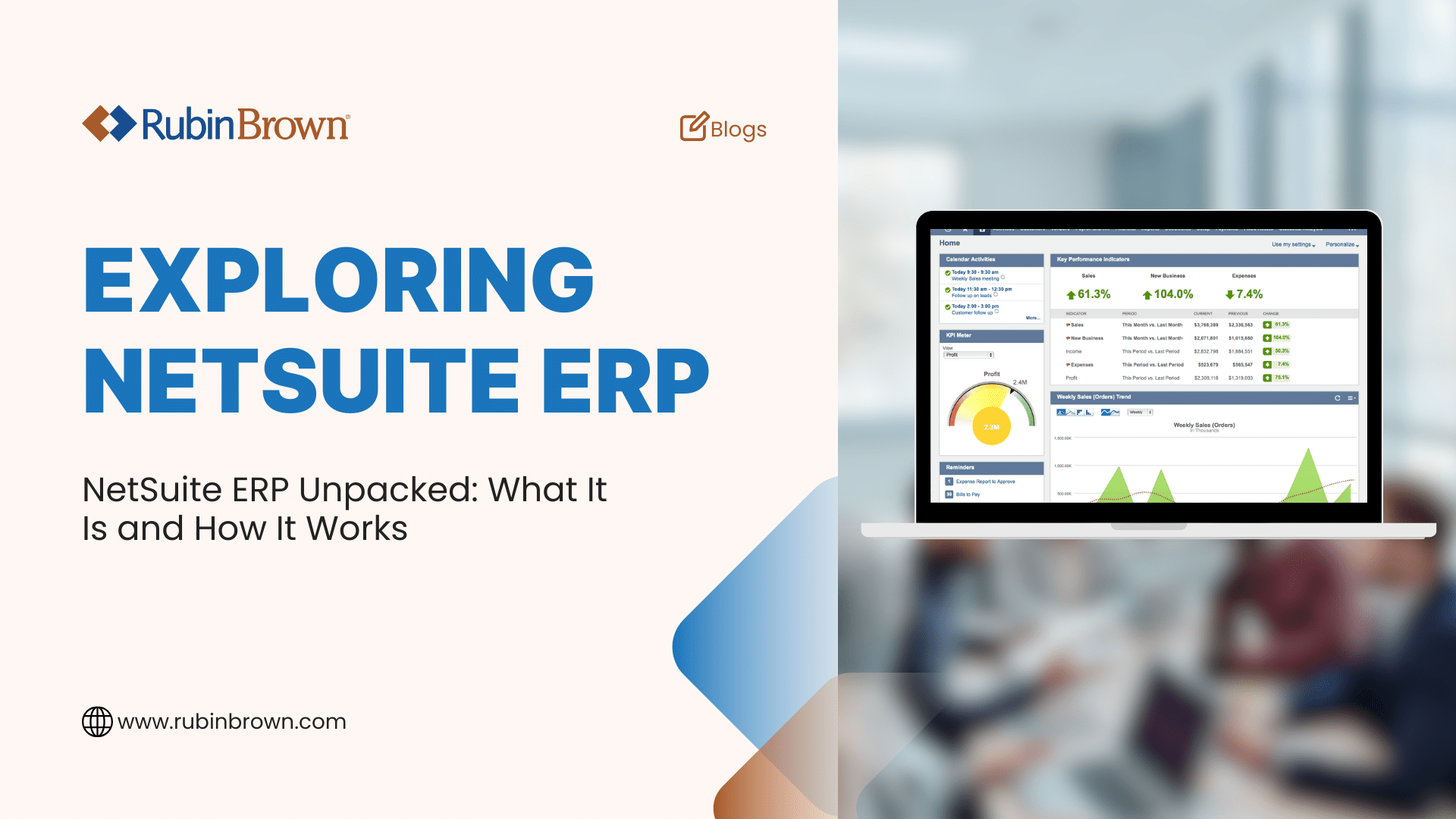1 min read
Best ERP Solution Providers: Compare Top ERP Vendors & Systems
Is Your ERP Strategy Future-Ready? The Top Solutions for 2026 and Beyond: Selecting the right ERP solution providers and ERP software vendors has...
9 min read
David Warford Sr. : Updated on December 8, 2025

Oracle continues to set the standard for enterprise software, recently being named a Leader in the 2025 Gartner® Magic Quadrant™ for Cloud ERP for both Product-Centric and Service-Centric Enterprises. With a reported 22% growth in Fusion ERP revenue in fiscal 2025, it remains the top choice for global organizations scaling their operations.
Developed by Oracle Corporation, it unifies financial management, procurement, project management, and supply chain management into a single, integrated platform. In this blog, we'll discuss how this cloud ERP leverages the power of cloud computing, offers unparalleled flexibility, scalability, and real-time data access, to enable efficient operations and informed decision-making.
Seamlessly integrating with other Oracle and third-party systems, Oracle ERP Cloud fosters a connected enterprise ecosystem. This integration enhances collaboration and communication across departments, supporting strategic decision-making with a holistic view of business operations.
TL;DR: Oracle ERP Cloud is a robust cloud-based ERP solution designed to streamline business operations. It integrates financial management, procurement, project management, and supply chain management into a single platform. By leveraging cloud computing, it offers flexibility and real-time data access. Advanced technologies like machine learning and AI enhance efficiency, security, and decision-making. Its seamless integration with other systems creates a unified enterprise ecosystem, driving operational efficiency and strategic growth.
Oracle ERP Cloud is a cloud-based enterprise resource planning solution developed by Oracle Corporation to streamline business operations. It integrates financial management, procurement, project management, and supply chain management into one platform. By utilizing cloud computing, it offers flexibility, scalability, and real-time data access for efficient business operations and data-driven decisions.
This ERP Solution automates key business processes with technologies like machine learning and artificial intelligence. It offers predictive analytics, reduces manual errors, optimizes resources, and enhances overall efficiency. The system also provides strong security measures to protect sensitive data, ensuring a secure transition to the cloud.
Oracle ERP Cloud integrates seamlessly with other Oracle and third-party systems, creating a connected enterprise ecosystem. This integration supports collaboration and communication across departments and aids in strategic decision-making by providing a comprehensive view of business operations.
Oracle ERP Cloud offers a unified platform that streamlines key business functions, making it ideal for organizations aiming to modernize their ERP systems. It integrates financials, procurement, project management, risk management, and other critical processes into one solution. Oracle automates over 80% of financial processes, including accounting for intercompany transactions and tax reporting, which significantly reduces manual effort and accelerates the closing of financial books. Here's a breakdown of its key features:
Financial Management
Oracle ERP Cloud delivers comprehensive financial management, covering general ledger, accounts payable, receivable, fixed assets, and cash management. It offers real-time financial insights, advanced analytics, and automation to support informed decision-making and maintain financial stability.
Procurement
The procurement module simplifies purchasing, reduces costs, and enhances supplier collaboration. It includes supplier management, purchasing, sourcing, and contract management, allowing businesses to efficiently manage the procurement lifecycle while enforcing compliance and controlling costs through self-service capabilities.
Project Management
Oracle ERP Cloud supports effective project planning, execution, and monitoring. It includes tools for resource management, costing, billing, and project analytics, providing real-time insights to track progress, manage budgets, and ensure projects are delivered on time and within scope.
Supply Chain Management
This module optimizes supply chain operations with features for inventory management, order management, procurement, and logistics. Advanced analytics and automation help reduce costs, improve visibility, and enhance customer satisfaction.
Human Capital Management (HCM)
Oracle ERP Cloud offers a comprehensive HCM solution that spans the entire employee lifecycle, including talent management, payroll, workforce planning, and learning management. It helps businesses attract and retain talent while ensuring compliance with labor regulations.
Risk Management and Compliance
The platform includes tools for managing internal controls, audits, and regulatory compliance. By automating these processes, Oracle ERP Cloud helps businesses proactively manage risks and adhere to industry standards.
Analytics and Reporting
Oracle ERP Cloud provides robust analytics and reporting tools, offering real-time business insights. Customizable dashboards and reports allow organizations to monitor key metrics and make data-driven decisions.
Globalization and Localization
Designed for global operations, Oracle ERP Cloud supports multi-currency, multi-language, and multi-entity management, ensuring compliance with local regulations while standardizing processes across regions.
Integration and Extensibility
Oracle ERP Cloud integrates seamlessly with other Oracle products and third-party applications through an open API framework, allowing for easy expansion and scalability as business needs change.
Continuous Innovation
Oracle regularly updates the platform with new features, ensuring organizations always have access to the latest technology and capabilities, helping them stay competitive and adaptable in a changing business environment.
Agentic Finance
The biggest shift for 2026 is the move toward 'Agentic Finance.' Oracle has released over 50+ role-based AI agents embedded directly into the Fusion platform. Unlike simple chatbots, these agents can autonomously identify anomalies in general ledgers, recommend supply chain pivots during disruptions, and automate complex close processes without human intervention.
As businesses grow, so do their operational needs. The choice between traditional on-premise ERP systems and cloud-based ERP solutions is now crucial for organizations aiming to modernize. Here’s why Cloud ERP, like Oracle ERP Cloud, is increasingly favored over traditional ERP:
Scalability and Flexibility
Cloud ERP systems offer greater scalability than traditional options, enabling businesses to adjust their operations as needed without worrying about physical infrastructure. This flexibility allows companies to adapt to market changes and growth opportunities without heavy upfront investments.
Lower Total Cost of Ownership (TCO)
Traditional ERP systems require significant upfront investments in hardware, software, and ongoing maintenance. Cloud ERP, on the other hand, operates on a subscription model, eliminating large capital expenses. Businesses pay only for what they use, reducing the overall cost of ownership and improving budget management.
Faster Implementation and Time-to-Value
Deploying traditional ERP systems can be a lengthy process, often taking months or years. Cloud ERP solutions like Oracle ERP Cloud offer quicker implementations, leading to faster realization of value. This rapid deployment helps organizations remain competitive and responsive to market needs.
Automatic Updates and Innovation
Cloud ERP systems provide continuous updates and new features automatically. Unlike traditional ERP systems, which require manual upgrades, Cloud ERP ensures that businesses always have access to the latest innovations, security enhancements, and compliance features without operational disruption.
Enhanced Security and Compliance
Cloud ERP providers invest heavily in security, offering advanced data protection that often surpasses what individual companies using traditional ERP systems can achieve. With Oracle ERP Cloud, businesses benefit from enterprise-grade security, regular audits, and compliance with global standards, reducing the risk of data breaches and ensuring regulatory adherence.
The value of these updates is measurable. Recent data from Nucleus Research and Oracle's fiscal reports indicate that organizations utilizing these latest AI automation tools are seeing project timelines shrink, with 85% of enterprises reporting successful ROI when partnering with specialized consultants for deployment.
Oracle ERP Cloud has both benefits and drawbacks that businesses should evaluate. On the positive side, its integration capabilities and scalability are key advantages. The platform integrates well with other Oracle products and external systems, making it suitable for businesses of all sizes. This scalability allows organizations to grow without heavy investments in infrastructure. Additionally, Oracle ERP Cloud can lower total cost of ownership (TCO) compared to on-premise ERP solutions by reducing the need for extensive hardware and maintenance.
The platform's user-friendly features improve accessibility, even for those with limited technical skills. Tools like easy data export to Excel enhance usability and enable deeper data analysis. Real-time data access from anywhere boosts productivity and reduces reliance on IT for data management. Oracle also handles automatic updates, ensuring users always have the latest features and security patches without manual effort.
However, there are challenges to consider. The implementation process can be complex and time-consuming, particularly for organizations with limited IT resources, leading to longer deployment times and increased costs. While Oracle ERP Cloud may reduce some costs, its licensing and ongoing maintenance fees can be high, which can be a burden for small and medium-sized businesses. Additionally, the platform may not offer the level of customization needed for unique business processes, limiting its suitability for organizations with specific requirements. The system's comprehensive nature can also lead to a steep learning curve, impacting productivity during the initial adoption phase. Finally, reliance on Oracle for support and updates could be a risk if the vendor changes its pricing or strategic direction.
Oracle ERP Cloud is a comprehensive cloud-based software suite designed to streamline and enhance enterprise resource planning (ERP) across various business functions. This powerful platform integrates multiple modules that cater to different operational needs, enabling organizations to manage their processes efficiently and effectively.
Financials Cloud
This module provides a robust financial management solution, covering general ledger, accounts receivable, accounts payable, cash management, and more. It is tailored for global enterprises, offering scalability and integration across various financial processes.
Project Management Cloud
Designed for project-centric businesses, this module facilitates complex project and program management. It integrates project financial management, enhancing profitability and ensuring effective project execution.
Supply Chain Management Cloud
This module addresses inventory management, material resource planning, and logistics. It streamlines the source-to-pay process, improves operational efficiency, and helps control costs.
Procurement Cloud
This component automates the procurement process, enhancing collaboration and cost control while ensuring higher margins.
Risk Management Cloud
Utilizing artificial intelligence, this module automates risk analysis, ensuring compliance with regulations such as SOX and GDPR, and helps prevent financial fraud.
Enterprise Performance Management Cloud
This module focuses on business planning, allowing organizations to perform scenario modeling, financial consolidation, and in-depth analysis of performance metrics.
Oracle ERP Cloud operates on a true Software-as-a-Service (SaaS) model, hosted by Oracle. This ensures that users receive regular updates and support directly from the vendor, eliminating the need for on-premise installations. The platform supports both public and private cloud implementations, as well as hybrid deployments, providing flexibility to meet diverse business requirements.
When evaluating Oracle ERP Cloud, understanding its pricing and licensing is key to making the right decision for your business. Oracle ERP Cloud offers a flexible model suitable for various business sizes and industries, allowing you to scale as your organization grows.
Base Pricing
At the heart of Oracle ERP Cloud's pricing is a straightforward model. Typically, you can expect to pay around $625 per month or $7,500 per year per user. This base cost is a good starting point for budgeting, but remember, it can add up quickly!
Minimum User Requirement
One crucial detail to keep in mind is the minimum user requirement. Oracle mandates that you have at least ten users. This means your annual cost starts at $75,000. If you’re looking at a three-year contract, you’re looking at a total minimum investment of $225,000. So, it’s essential to assess your user needs carefully.
Contract Duration
Oracle typically requires a three-year contract for its ERP Cloud services. This long-term commitment can be a significant factor in your decision-making process, especially if your business needs are likely to change.
Additional Services
Beyond the base ERP service, any additional features or services you require will come at an extra cost. It’s vital to evaluate your organization’s specific needs to avoid overspending on unnecessary services.
Hosted Named User
The primary licensing metric for Oracle ERP Cloud is the Hosted Named User model. This means that each individual who has access to the service, regardless of how often they use it, requires a license. Even users who may not actively engage with the platform but have access rights will count towards your licensing costs.
Self-Service Cloud Service
For businesses that want a bit more flexibility, Oracle offers a Self-Service Cloud Service priced at approximately $20 per month per user. However, keep in mind that there’s a minimum purchase requirement of 100 users.
When navigating Oracle ERP Cloud licensing, many organizations stumble into common traps. Here are a few to watch out for:
Purchasing Unnecessary Services: It’s easy to get caught up in the features and buy services that your organization doesn’t actually need. Take the time to evaluate what’s essential for your operations.
Failing to Negotiate Contracts: Many businesses don’t fully understand the licensing model and miss out on opportunities to negotiate better pricing. Don’t hesitate to ask for a better deal!
Ignoring Hidden Costs: Be aware that costs can arise from non-production environments and data transfers. These hidden fees can lead to unexpected expenses if you’re not careful.
Selecting the right ERP system is a critical decision that directly impacts your organization's efficiency, scalability, and success. With many ERP solutions available, it's essential to choose one that aligns with your company’s specific needs, goals, and future plans. Start by conducting a thorough business assessment to identify areas needing improvement, considering factors like organization size, industry requirements, and long-term objectives. The ERP solution should address these needs and support business growth.
Scalability and flexibility are key considerations. Your ERP system must scale with your business, allowing customization and module expansion as needed. The system should meet current needs while evolving with your business, either by adding new functionalities or integrating with other systems. Consider the total cost of ownership, including maintenance, upgrades, and integration, and focus on long-term ROI. A well-chosen ERP should provide benefits like increased efficiency, better decision-making, and enhanced customer satisfaction that justify its costs.
Choosing the right vendor is also crucial. Ensure the vendor has a proven track record in your industry and offers robust support throughout the ERP lifecycle, from implementation to ongoing maintenance. Their expertise can reduce risks and facilitate a smoother deployment. Additionally, decide between cloud-based and on-premises solutions. Cloud ERP systems, such as Oracle ERP Cloud, offer lower upfront costs, automatic updates, and accessibility, while on-premises systems may provide more control and customization. Base your decision on your company’s specific needs and IT infrastructure.
Oracle ERP Cloud is a comprehensive enterprise resource planning solution that integrates financial management, procurement, project management, and supply chain management into a unified platform. Leveraging cloud computing, it provides flexibility, scalability, and real-time data access, allowing businesses to make informed, data-driven decisions. Advanced technologies like machine learning and artificial intelligence enhance automation, predictive analytics, and operational efficiency, while robust security measures protect sensitive data. With seamless integration capabilities and a user-friendly interface, Oracle ERP Cloud fosters collaboration and efficiency across all departments, driving business growth and maintaining a competitive edge in today's dynamic market.
Choosing the right ERP system can be challenging. RubinBrown's ERP Vendor Selection service makes it easier by offering expert guidance throughout the process. Their specialists provide unbiased recommendations to help you find the ERP software that best fits your business needs, turning a complex task into an opportunity for strategic growth and operational efficiency.

1 min read
Is Your ERP Strategy Future-Ready? The Top Solutions for 2026 and Beyond: Selecting the right ERP solution providers and ERP software vendors has...

1 min read
In a time where digital advancements influence the rate of business expansion, choosing the right cloud-based business management platform is...

Selecting the right enterprise resource planning (ERP) system for your business can help you streamline your operations, improve efficiency, and...